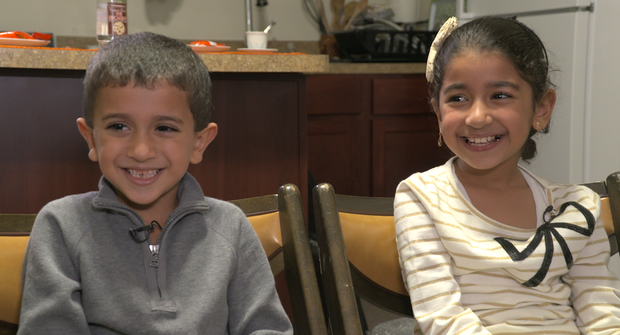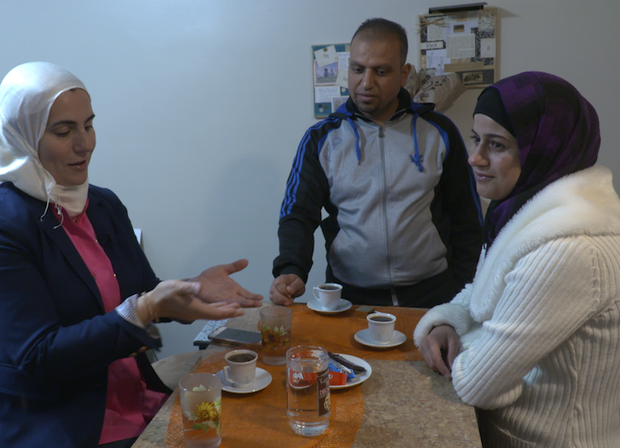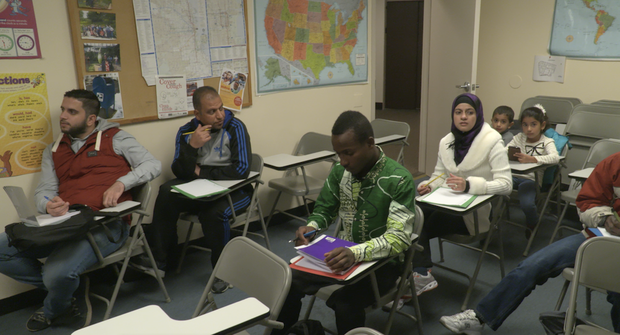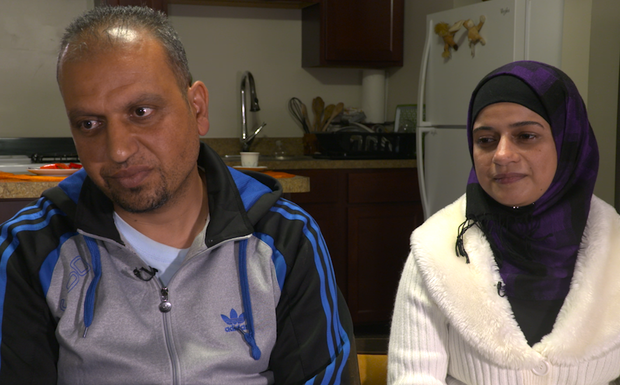Despite opposition, Syrian refugee families strive for better lives in U.S.
Three months after coming to America, the Obaidat family is still settling into their new life in a modest one-bedroom apartment on Chicago's North Side:
"When I drop the kids at school, people are very welcoming, the school is excellent," said Asma Obaidat, through a translator, adding how she didn't expect Chicago residents would be so "warm."
Muhammad and Asma Obaidat and their two children, 9-year-old Redaj and 6-year-old Akram, fled violence in Damascus after the Syrian war broke out four-and-a-half-years ago. They waited for two years in Jordan for permission to enter the U.S.
"Nobody wants to abandon their country," said Muhammad Obaidat. "But the situation is difficult -- very difficult."
The plight of refugee families like the Obaidats may be even more difficult in the wake of the Paris terror attacks, for which the Islamic State of Iraq and Syria (ISIS) took credit. While only one of the eight attackers is said by authorities to have come from Syria, more than a dozen U.S. governors have expressed opposition to taking in Syrian refugees, based on the fear that terrorists could infiltrate those groups.
Refugee advocates dispute states' power to ban refugees from specific countries, citing the Refugee Act of 1980.
"Refugees are just like you and me," said Suzanne Akhras, a Syrian-American community advocate in Chicago. She runs a small nonprofit, Syrian Community Network, that raises money for necessities like food and clothing, and visits refugee families.
"A refugee is someone who has lost everything who needs to rebuild their life who needs to find shelter for their family," said Akhras.
Speaking at the G-20 Summit in Turkey on Monday, President Obama affirmed that the U.S. will continue to take more Syrian refugees, using "rigorous security checks."
America's annual quota for refugee resettlement is 70,000 and it's expected to rise, in part because of the war in Syria, to 75,000 next year. The refugee crisis has reached a critical point, spilling into Europe and beyond, and advocates are pushing the U.S. to accept more refugees. America has taken in 2,070 refugees from Syria across 180 towns and cities since the conflict began in 2011. Of those, roughly 1,300 were resettled in the past 12 months.
Despite concerns from some U.S. politicians, the Obaidats and hundreds of their fellow Syrians are nonetheless here, trying to create a community that will help them cope with the challenge of being strangers in a new land.
The resettlement process overseas can take as long as 18-24 months from the time a UNHCR referral is received to the time a refugee arrives in America to be resettled.
Upon arrival, the Department of State's Reception and Placement Program provides funding to resettlement agencies to support refugees during their first 30-90 days in the United States. The current Reception and Placement per capita grant is $2,025, intended to partially cover initial case management costs and support to refugees. Of that sum, each refugees receives about $1,000 for necessities such as rent, clothing and food.
"It's very difficult to think about our homeland ... but at the same time, at the end of every week here, when the children are no longer at school, we can get together with our friends who are other refugees, and go to the lake for a picnic," said Muhammad, glancing at his wife. "We enjoy that."
The children attend regular school in English and are picking up the language slightly faster than their parents.
"God-willing, in 10 years we will have learned the language, and our situation will be better than this," Asma said.
"And we hope our health gets better," said Muhammad, who was diagnosed with cancer just before the war broke out in Syria. He was unable to get regular treatment and a part of his left hand was amputated. He's currently receiving treatment through a Medicaid program, since refugees are eligible for the same public assistance programs as U.S. citizens and other legal residents. Refugees are also placed on a pathway to U.S. citizenship.
They receive additional support from private groups like the Syrian Community Network:
"We should try to read about the history of what's going on [in Syria], and have a bigger perspective and not just see Syria through the lens of ISIS, but see Syria as a humanitarian crisis," said Akhras.
"We set up in early 2015, after we heard [the U.S.] would be receiving more refugees from Syria," she added. "We thought Chicago would be a hub, especially because of the established Syrian-American community here."
Akhras came to America as an immigrant from Syria when she was 10 years old. Her husband is the advocacy director at the Syrian American Medical Society (SAMS), where she previously worked before setting up her own organization that caters specifically to refugees.
"I understand the challenges that they have, I remember that sense of loss as a child - when you don't know what baseball is, what kickball is," said Akhras. "This is a quiet neighborhood, their school is nearby, there are many shops nearby that sell Arabic food and Arabic groceries.
"It's a comfort to them, when they have to do their daily errands, to know that people can speak their language."
Akhras and her small team of seven volunteers visit refugees in their homes at least once a week, and offer advice and guidance on things like job applications and children's schooling. In Chicago, most of the refugees are initially processed through a local resettlement agency called Refugee One.
"When refugees are processed in different overseas countries and ready to travel, we receive notification," Melineh Kano, executive director of Refugee One, who came to America in 1984 as a refugee from Armenia, told CBS News. "We're at the airport to welcome them, and we usually have homes set up for them ... and from the following day basically services will begin for them."
These services include financial support - stipends for food and necessities such as clothing, as well as job training and English language lessons. Some refugees are also eligible for Refugee Cash and/or Medical Assistance administered through the Office of Refugee Resettlement at the Department of Health and Human Services, which carry a maximum benefit of eight months after arrival in the U.S.
According to the State Department, early economic self-sufficiency is a cornerstone of the refugee admissions program, and many refugee families have at least one income earner within a few months of their arrival in the United States. There is, however, no comprehensive data about how many refugees are employed and how long it took them to find employment.
Muhammad Obaidat, still struggling with his health, hasn't found work yet, but insists he isn't in search of a free ride.
"I want people to know when a Syrian comes to America they're not trying to be a burden on anyone. When a Syrian comes to America, of course they're not going to sit high above other people. He's going to work, he's going to contribute to the country," he said.
His wife plans to start looking for work soon.
On a recent Wednesday afternoon, after their English language lesson at Refugee One, the Obaidats were paid a home visit by Akhras:
"We are very lucky to be able to do this," said Akhras, as Asma served the Arabic coffee she had just made - as is custom - on a tray with a single glass of water among the white coffee cups. The children played on a smartphone and flicked through cartoons on an old T.V. set.
"Yes, there's hardships because [they] have to learn new language and a new culture - but that is our job now," said Akhras. "We can bridge those gaps and make sure their resettlement goes smoother."
"Why wouldn't we want people like that, who are willing to roll up their sleeves, and get to work to start over."
The death toll from Syria's war is estimated to be more than 250,000 people. Four million Syrians are refugees, and another 7 million are displaced within their own country due to violence. The U.S. has so far provided more than $4 billion in humanitarian aid.



